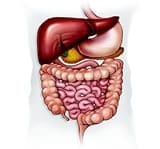If you’ve been diagnosed with hypothyroidism, or “underactive thyroid”, your doctor’s focus may be on determining the right dose of your thyroid medication or pinpointing one of the many causes of this condition. You may have symptoms such as constipation, bloating, gas pain, lethargy, or weight gain, which led to the hypothyroidism diagnosis. Where is your focus, and how do your help yourself?
First, here’s a little primer on the increasing evidence suggesting that thyroid disorders and poor digestive health go hand-in-hand. Hypothyroidism slows down the movement of food through your digestive tract, causing constipation and malabsorption of nutrients. It may also cause “leaky gut syndrome,” in which your intestines become permeable, allowing undigested food to enter the bloodstream, triggering a reaction by your immune system (Source: Chris Kresser).
Poor gut health may contribute to thyroid issues, as up to 20% of thyroid function relies on an adequate supply of healthy bacteria to convert T4 hormones into T3 hormones. This healthy bacteria comes from – you guessed it – your digestive tract (Source: Dr. Ridha Arem). In addition, if you are gluten intolerant, that may lead to inflammation, which can impair thyroid function. The strong link between autoimmune thyroid disease and gluten intolerance has prompted some researchers to suggest that those with autoimmune thyroid disease be screened for gluten intolerance, and vice-versa (Source: Chris Kresser).
So what are some ways you can help yourself with the one-two punch of hypothyroidism and digestive upset? Start by taking advantage of the natural healing powers in your kitchen. We know that a healthy diet consists of fresh fruits and vegetables, whole grains, nuts, and seeds, lean meats, limiting white sugar, flour, and processed foods, and eating organic when possible to reduce pesticide exposure. Following these guidelines as much as possible is certain to improve your overall health.
When you have digestive and thyroid issues, a few tweaks to this formula can make you feel better. Drink plenty of water, in addition to other beverages, to prevent dehydration and help food move through your system. Your optimal amount of daily water intake depends on several factors, such as activity level and where you live. A basic formula is to take your weight and divide that number by two to come up with the approximate number of ounces of water (Source: Livestrong). If your urine is consistently clear to pale yellow, your water intake is likely sufficient. If it is dark yellow, this may be an indication of dehydration.
Make sure you are consuming iodine-rich foods, as iodine is critical to the production of thyroid hormone. According to the Centers for Disease Control, iodine levels in the US have fallen by 50% in the last 30 years, even as incidences of thyroid disorders have risen. We assume that we’re getting enough iodine if we use iodized salt, aka table salt, but only 10% of the iodine in salt is readily absorbed by the body. Even chemically processed foods, which used to be fortified with iodine, now contain bromine instead, a chemical which competes with iodine in the body (Source: Dr. David Brownstein’s Natural Way to Good Health). Instead of consuming more table salt, which is chemically processed and stripped of vital trace nutrients, switch to unrefined salt, such as Celtic Brand salt or Redmond’s Real Salt, and get your iodine through other foods. Good sources of iodine include sea vegetables such as kelp and wakame seaweed, ocean fish, organic yogurt, cranberries, and potatoes with their skins (Source: Global Healing Center).
Sufficient iodine intake also negates the influence of goitrogens on your thyroid. Goitrogens are naturally occurring chemical compounds in foods that may suppress thyroid function or prevent absorption of iodine. Goitrogenic foods include kale, broccoli, cauliflower, and spinach, and non-fermented soy products such as tofu, edamame, and soymilk. As cruciferous vegetables in particular provide a range of health benefits, don’t be afraid to eat them, unless, of course, they disagree with you! Cooking these foods reduces their goitrogenic properties (Source: Women to Women).
As with most things in life, moderation is key, particularly when it comes to food. Too much of any food, especially at one sitting, can cause excessive digestive discomfort. Too much iodine can exacerbate thyroid issues. A health care practitioner who specializes in functional medicine can assist you with concerns you may have by providing specialized and more detailed thyroid and iodine tests.
Exercise also helps with digestive problems, as it helps move food through your system and reduces constipation. Consistent, moderate-intensity exercise stimulates the thyroid gland to produce more hormone, which increases your metabolism (Source: Livestrong). Studies also show that exercise acts as a natural anti-depressant. Walking, biking, Zumba, and other activities which elevate your heart rate are good choices.
Diet and exercise, along with energy medicine or Reflexology, can go a long way towards easing digestive discomfort caused by hypothyroidism. Remember to be good to yourself and honor the little things you do to help yourself feel better. It all adds up.
About Renee Adamson – Renee has a certification in integrative nutrition.
———————————-
The Healing Place has helped hundreds of adults and children to find long-lasting relief from chronic pain, digestive issues and heal hormonal imbalances naturally.
Helen Chin Lui is a certified Reflexologist, Certified Energy Medicine and Reiki Practitioner. She is the founder and owner of the Healing Place in Medfield. She specializes in helping people with chronic digestive disorders. For her free report “Proven Alternative Ways to Heal Common Chronic Digestive Problems: What Your Doctor Doesn’t Know Can Keep You From Healing” click here.










 The Healing Place LLC helps all ages to find relief from chronic pain, chronic digestive problems and balance hormones naturally. We practice COVID19 safety. Don’t forget to check on our online school HealingPlaceEnergySchool.com. Thank you.
The Healing Place LLC helps all ages to find relief from chronic pain, chronic digestive problems and balance hormones naturally. We practice COVID19 safety. Don’t forget to check on our online school HealingPlaceEnergySchool.com. Thank you.
Recent Comments